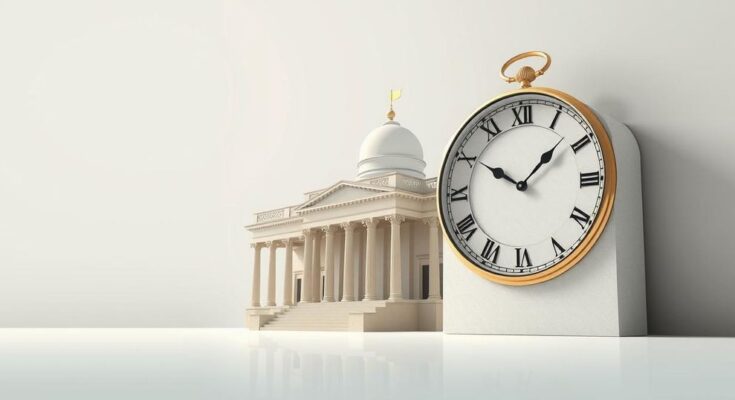Cameroon’s President Paul Biya, at 91, is likely to seek an eighth term, raising concerns over his health and ability to govern. Opposition parties are fragmented, providing no clear alternatives. Economic struggles persist amid corruption and civil unrest, leading to calls for better governance but also criticism of their sincerity. The political landscape remains precarious as elections approach.
As Cameroon approaches its upcoming elections, President Paul Biya, at 91 years old, is expected to seek an eighth consecutive term, potentially extending his rule to 2032. Political commentator Dr. John Akpo has indicated that Biya’s party members are actively supporting his candidacy despite concerns regarding his health. Elvis Ngolle Ngolle from the Cameroon People’s Democratic Movement (CPDM) mentioned that the party is preparing for the elections, although he refrained from making definitive statements about Biya’s candidacy.
Biya has held power for over 42 years, and should he be re-elected, he would be 99 during the next election cycle. Although some opposition parties show support for him, Dr. Akpo questions their intent, claiming they are merely extensions of the ruling party designed to undermine legitimate opposition.
While Biya is credited with establishing a multi-party democracy in Cameroon, his tenure has been marred by a lingering civil conflict involving Anglophone separatists, which has significantly hampered economic growth. Opposition politician Tamfu Richard stated that Biya’s advanced age has restricted his ability to engage with crisis-hit regions, leading to a perception of detachment from pressing national issues.
Critics assert that Biya has suppressed political dissent, exemplified by the imprisonment of peaceful protesters, including Maurice Kamto, who faced nine months of imprisonment in 2019 without charges due to international pressures. The ruling CPDM remains reliant on coalition partners to maintain legislative authority, even as their support wanes, with predictions of a challenging electoral backdrop.
Recent comments from Catholic bishops have stirred controversy, with some advocating for better living conditions and a transition in leadership, though they faced criticism from state entities, insisting their calls were not for Biya’s resignation but for government improvement efforts.
Economically, Cameroon is facing challenges, with real GDP growth slowing to 3.3% in 2023, hindered by internal conflicts and inflation. However, a slight recovery began in early 2024, highlighting potential for economic improvement. Yet, poverty remains an issue, with approximately 23% of the population living under extreme poverty.
Corruption persists as a massive concern, undermining state initiatives and citizens’ welfare, as indicated by Akpo’s comment on how deeply ingrained corruption is within the political sphere. Moreover, persistent structural problems limit the country’s development and growth prospects, casting doubt on whether conditions will improve under continued Biya leadership. Opposition factions are fragmented, providing no viable alternative, and some citizens seem to prefer stability over uncertainty.
In conclusion, as Paul Biya prepares for another term, the political landscape in Cameroon remains precarious. The intertwining issues of governance, civil unrest, and economic strain render the future of the nation uncertain. Despite calls for change, the lack of viable alternatives to Biya casts a shadow over prospects for genuine reform and progress in Cameroon.
The political situation in Cameroon is dominated by President Paul Biya, who has been in power for over 42 years. His anticipated candidacy for an eighth term highlights significant concerns regarding his health and fitness for the role, as the country faces economic challenges and social unrest. The fracturing of opposition parties further complicates the electoral landscape, raising questions about the future of governance and the potential for meaningful change in the country. Recent remarks from religious figures underscore the demand for better governance, yet controversy remains about their implications for leadership transitions. Amid economic struggles, the population’s welfare hangs in the balance, along with concerns about growing corruption and instability under Biya’s continued rule.
In summary, Paul Biya is poised to run for another term as president of Cameroon amid significant political, social, and economic challenges. Despite longstanding governance issues and a fragmented opposition, many citizens seem to favor the status quo. The country’s future under Biya’s leadership remains uncertain, marked by continued corruption, civil unrest, and the pressing need for substantive reform.
Original Source: www.dw.com




